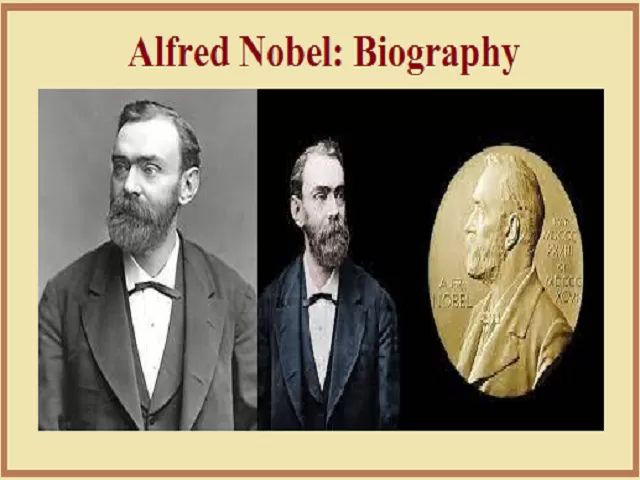Alfred Nobel Biography: Alfred Nobel was a Swedish chemist, engineer, and industrialist. He invented dynamite and other explosives. He is famous for the annual prizes in science, literature, and peace awarded in his name.
Alfred Nobel: Early Life and Education
He was born in Stockholm, Sweden on October 21, 1833. His father was Immanuel Nobel and his mother was Andriette Ahlsell Nobel. His father was an engineer and inventor. Immanuel Nobel built bridges, buildings, and experimented with several ways of blasting rocks.
When Alfred Nobel was a child, he was prone to illness but he enjoyed a close relationship with his mother. He had an intellectual curiosity from an early age. He had an interest in explosives and he learned the fundamentals of engineering from his father.
Immanuel's business ventures suffered losses and then he moved to St. Petersburg, where he started business as a manufacturer of explosive mines and machine tools. His family left Stockholm in 1842 and came to St. Petersburg. Alfred, at the age of 17, could speak and write in Swedish, Russian, French, English, and German.
In 1850, Alfred Nobel left Russia and spent a year in Paris studying chemistry. Then he spent time in the United States and worked under the direction of John Ericsson, the builder of the ironclad warship Monitor. In 1852, he returned to St. Peterburg where he worked in his father's factory, which made military equipment during the Crimean War.
In 1856, the war ended and the factory faced a bad time and had difficulty in switching to peacetime production of steamboat machinery. In 1859, the factory went bankrupt. Alfred and his parents returned to Sweden.
Alfred Nobel: Inventions
In 1862, Nobel built a small factory to manufacture nitroglycerin. And also he undertook research to find a safe way to control the detonation of the explosives.
He invented a practical detonator in 1863. It consists of a wooden plug that was inserted into a larger charge of nitroglycerin held in a metal container. This invention marked the beginning of Nobel's reputation as an inventor and also the fortune he was to acquire as a maker of explosives.
A blasting cap which was an improved detonator was invented by the Nobel in 1865. This invention inaugurated the modern use of high explosives.
His next important invention was dynamite in 1867. He was granted patents for it in Great Britain (1867) and the United States (1868). With the invention of dynamite, he gained fame across the world and was soon put to use in blasting funnels, cutting canals, and building railways and roads. To manufacture dynamite, Nobel built a network of factories throughout Europe in the 1870s and 80s.
He invented a more powerful form of dynamite and named it blasting gelatin in 1875. He patented it the following year. Also, by chance, he had discovered that mixing a solution of nitroglycerin with a fluffy substance called nitrocellulose results in a tough, plastic material. It has a higher resistance and greater blasting power than ordinary dynamites. He introduced ballistite in 1887. It was one of the first nitroglycerin smokeless powders and a precursor to cordite.
Various things were also invented by him like artificial silk, and leather, etc. He altogether registered more than 350 patents in several countries. He was never married.
Alfred Nobel had an interest in Literature
He had an interest in literature and wrote various plays, novels, and poems. But most of them remained unpublished.
Establishment of Nobel Prizes
He developed angina pectoris in 1895. In 1896, he died due to cerebral hemorrhage at his villa in San Remo, Italy.
At the time of his death, he had a vast business consisting of more than 90 factories manufacturing explosives and ammunition. He had deposited his will in a bank in Stockholm and surprised his family, friends, and the general public when it was opened.
He left the bulk of his fortune in trust to establish what came to be known as international awards, the Nobel Prizes.
The awards instituted by him reflect his lifelong interests in the field of physics, chemistry, physiology, and literature. The abundant evidence shows that the friendship with the prominent Austrian pacifist Bertha von Suttner inspired him to establish the prize for peace.
Alfred Nobel: Inspirational and famous sayings by him
1. “Contentment is the only real wealth.”
2. “Worry is the stomach's worst poison.”
3. “The truthful man is usually a liar.”
4. “Good wishes alone will not ensure peace.”
5. “Lying is the greatest of all sins.”
6. “Justice is to be found only in the imagination.”
7. "I would not leave anything to a man of action as he would be tempted to give up work; on the other hand, I would like to help dreamers as they find it difficult to get on in life"
8. "Hope is nature's veil for hiding truth's nakedness"
9. "It is not sufficient to be worthy of respect in order to be respected"
10. “A heart can no more be forced to love than a stomach can be forced to digest food by persuasion.”
| Important Days and Dates in December 2021 | List of Nobel Prizes and Laureates 2020 |
